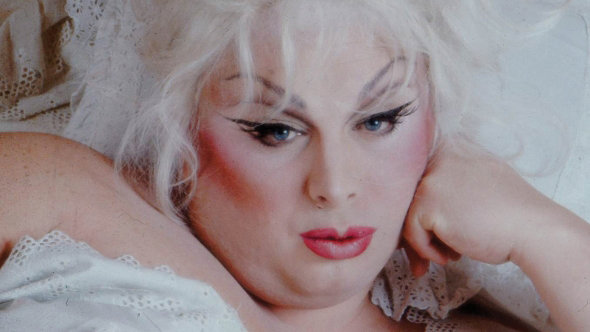![]() At Paramount, Josef von Sternberg turned Marlene Dietrich into a screen goddess. Forty years later, shoestring Baltimore filmmaker John Waters did the same, helping to mold a screen icon of a different sort, Harris Glenn Milstead, more famously known as the plus-size, gender-bending Amazonian screen heroine Divine, rightfully described in this affection tribute as a “cinematic terrorist,” “part outlaw, part serial killer.”
At Paramount, Josef von Sternberg turned Marlene Dietrich into a screen goddess. Forty years later, shoestring Baltimore filmmaker John Waters did the same, helping to mold a screen icon of a different sort, Harris Glenn Milstead, more famously known as the plus-size, gender-bending Amazonian screen heroine Divine, rightfully described in this affection tribute as a “cinematic terrorist,” “part outlaw, part serial killer.”
Von Sternberg reportedly declared his auteur/creator status with “I am Dietrich, and Dietrich is me,” but it was more of a team effort for Divine, who took more independent strides into the limelight. Makeup artist Van Smith is credited for coming up with her mile-high arched eyebrows and shaved hairline, besides designing a flaming red fishtail gown—see the poster of Pink Flamingos. And Divine chose a too-tight wardrobe, knocking down the ultra-dolled up drag ideal of the late 1960s, looking like Liz Taylor on a week-long bender.
Divine’s films by Waters are crude, the pacing sometimes potty but not slack. Waters’s focused scripts are both a homage to movie melodramas (take that, Far From Heaven) and drolly satiric, and Divine brought both timing and vulnerability to Female Trouble’s unhinged Dawn Davenport. More than 40 years later, there are very few films that can come approach the raunch and outrageousness of the midnight movie Pink Flamingos. Its ending doesn’t need to be reiterated (I hope); I have never been able to watch the final shot. (In a clip from Larry King’s CNN show, Milstead, sans Divine make-up, shows signs of exasperation about talking about its notoriety, but it has to be admitted, the film’s difficult to forget.)
The documentary I Am Divine charts his out-of-nowhere and singular career, from making crude 16mm films in the Baltimore boonies to his rise to cult status with the X-rated Pink Flamingos and then his mainstream success in the original Hairspray. By the time of his death in 1988 at age 42, the media, or the rest of the world, had been brought up to speed.
Milstead took the brash, rude, and grotesque Divine persona and strutted with it, working continuously for Waters for more than 20 years while also striking out on her own in indies (Lust in the Dust) and as a disco diva who posed no threat to Gloria Gaynor or Donna Summer. He declaimed, shouted really, without singing a note.
His colleagues, friends, and even his high school girlfriend honor him—Milstead insisted on doing her hair and makeup for the prom—without turning this practically tell-all film into a sloppy wet kiss. (He liked drugs; it was the ’80s.) Gay liberation in San Francisco, Studio 54, 1950s heartthrob Tab Hunter, and the ubiquitous Mick Jagger and Andy Warhol make guest appearances. A viewer could suffer whiplash just from how much he and pop culture changed in the course of 20 years, but the film has the added resonance of Frances Milstead’s frankness. She epitomizes a 1950s mother’s resistance and then acceptance of her gay son, however slowly.







I want to see this.